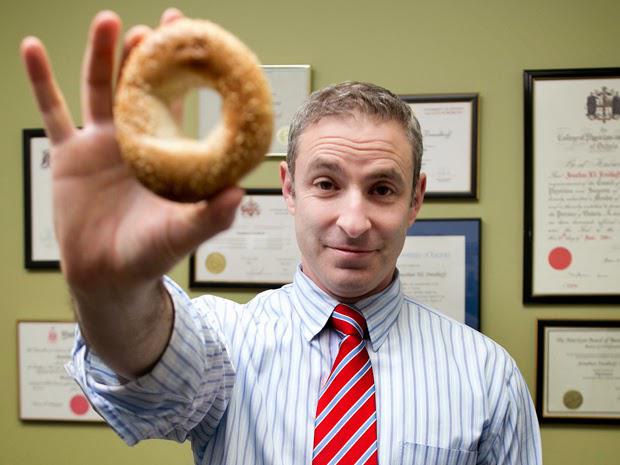740
Is it possible to be healthy, being overweight?
In harmony with soboyChto do if you are overweight and you are trying to lose it throughout life? What if while you are completely satisfied with their figure, but are afraid for their health?
You may have heard about the body mass index (BMI), which measures the degree of "fatness". It is important to note that this is not always the best way to measure, but it is light, so many doctors refer to it often. However, according to Spencer Nadolsky, a doctor, dealing with the problems of obesity at BMI has some limitations.

thin young man with a BMI of 27 is very different from women with abdominal obesity in postmenopausal women with the same index. BMI does not take into account many things, such as muscle mass. Doctors would be simpler if one could measure the amount of fat in your body by DEXA (densitometry), but it is not always possible.
Dr. Nadolsky believes that the best indicator of measurement is the percentage of fat in the body. For example, a person may have a BMI of 28 and is just a stone's throw away from obesity, but the proportion of fat in his body will be relatively low. This number is difficult to obtain, and it often requires expensive precision equipment.
BMI may also be used in combination with the measurements of the waist. This method is more affordable and efficient, and allows us to understand some of the limitations of BMI.
When obesity causes problems with zdorovemVy learned about some dimensions, weight-related, but it says nothing about what it means "to be overweight." This term implies that it is time to lose weight, so let's look at specific cases where you need to start doing it.
The risk of disease increases when the weight goes up. For example, if you already have insulin resistance, type II diabetes or heart disease, you need to lose weight. If you do not have these conditions, you can have a weight and stay healthy, depending on certain health indicators.
Nadolsky doctor says, "You can stay healthy even overweight." There are many people with excess body weight index 25 to 30 which are healthy in this range. In these terms it is necessary to consider in detail the parameters of metabolic health, and weight distribution. Blood pressure, blood glucose and lipid parameters also need to be taken into account to determine the risk profile.
It is obvious that only a doctor can tell if you threaten these diseases. Perhaps you are out of danger, and you do not need to lose weight for health reasons. Dr. Yoni Fridhoff Consultant "weighty" issues, which operates one of the largest clinics in the treatment of obesity in Canada, says: "My excess weight about two pounds, and yet I am quite well».

Health is not measured in kilograms. Weight does not reduce the risk of health problems, so prevention can be a fair argument for losing weight. But it is worth noting that a healthy lifestyle reduces the risk of most chronic diseases regardless of weight.
According to Dr. Nadolsky, there is one exception: a very high BMI. He argues that if your current health indicators in order, but a BMI greater than 30, then you might have heart disease, diabetes, metabolic syndrome, arthritis and so on. D.
There are three classes of obesity, each with escalating risks:
You may have heard about the body mass index (BMI), which measures the degree of "fatness". It is important to note that this is not always the best way to measure, but it is light, so many doctors refer to it often. However, according to Spencer Nadolsky, a doctor, dealing with the problems of obesity at BMI has some limitations.

thin young man with a BMI of 27 is very different from women with abdominal obesity in postmenopausal women with the same index. BMI does not take into account many things, such as muscle mass. Doctors would be simpler if one could measure the amount of fat in your body by DEXA (densitometry), but it is not always possible.
Dr. Nadolsky believes that the best indicator of measurement is the percentage of fat in the body. For example, a person may have a BMI of 28 and is just a stone's throw away from obesity, but the proportion of fat in his body will be relatively low. This number is difficult to obtain, and it often requires expensive precision equipment.
BMI may also be used in combination with the measurements of the waist. This method is more affordable and efficient, and allows us to understand some of the limitations of BMI.
When obesity causes problems with zdorovemVy learned about some dimensions, weight-related, but it says nothing about what it means "to be overweight." This term implies that it is time to lose weight, so let's look at specific cases where you need to start doing it.
The risk of disease increases when the weight goes up. For example, if you already have insulin resistance, type II diabetes or heart disease, you need to lose weight. If you do not have these conditions, you can have a weight and stay healthy, depending on certain health indicators.
Nadolsky doctor says, "You can stay healthy even overweight." There are many people with excess body weight index 25 to 30 which are healthy in this range. In these terms it is necessary to consider in detail the parameters of metabolic health, and weight distribution. Blood pressure, blood glucose and lipid parameters also need to be taken into account to determine the risk profile.
It is obvious that only a doctor can tell if you threaten these diseases. Perhaps you are out of danger, and you do not need to lose weight for health reasons. Dr. Yoni Fridhoff Consultant "weighty" issues, which operates one of the largest clinics in the treatment of obesity in Canada, says: "My excess weight about two pounds, and yet I am quite well».

Health is not measured in kilograms. Weight does not reduce the risk of health problems, so prevention can be a fair argument for losing weight. But it is worth noting that a healthy lifestyle reduces the risk of most chronic diseases regardless of weight.
According to Dr. Nadolsky, there is one exception: a very high BMI. He argues that if your current health indicators in order, but a BMI greater than 30, then you might have heart disease, diabetes, metabolic syndrome, arthritis and so on. D.
There are three classes of obesity, each with escalating risks:
- 30-34: Class 1. Obesity. This class is in a "gray zone" in terms of risk. It is important to make measurements of the waist in the laboratory to the doctor.
- 35-39: Class 2. Obesity. The risk of further weight gain.
- 40+: Class 3. Obesity. This is the highest class with the highest level of risk.
The decision about weight lossIf a person eats a healthy diet, regularly getting enough sleep, do not smoke, do not drink more than acceptable and cultivates friendships, he will be happy and in general good will live life h4> If you are completely healthy, but still want to be slimmer for personal reasons, change the diet and create the appropriate diet. If you do not have any health risks associated with the disease are overweight - this is your own choice.
According to Dr. Yoni Fridhoff, it is very important to lead a healthy lifestyle, "If a person eats a healthy diet, getting enough sleep regularly, do not smoke, do not drink more than acceptable and cultivates friendships, he will be happy and will live on the whole good life».
If you are really good in his own body - so for you there is no concept of "overweight».
via vitals.lifehacker.com/ask-lifehacker-can-i-really-be-overweight-and-still-he-1700492901























